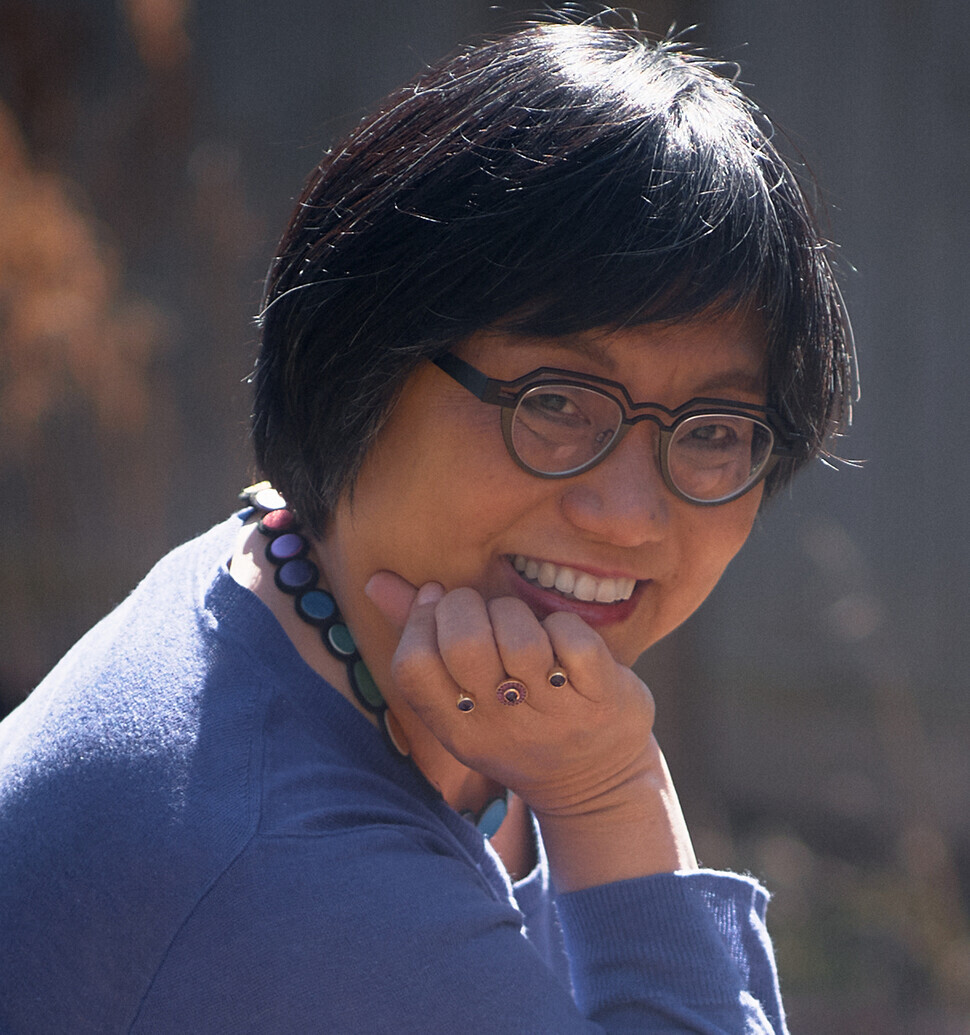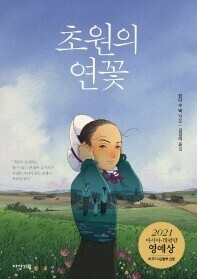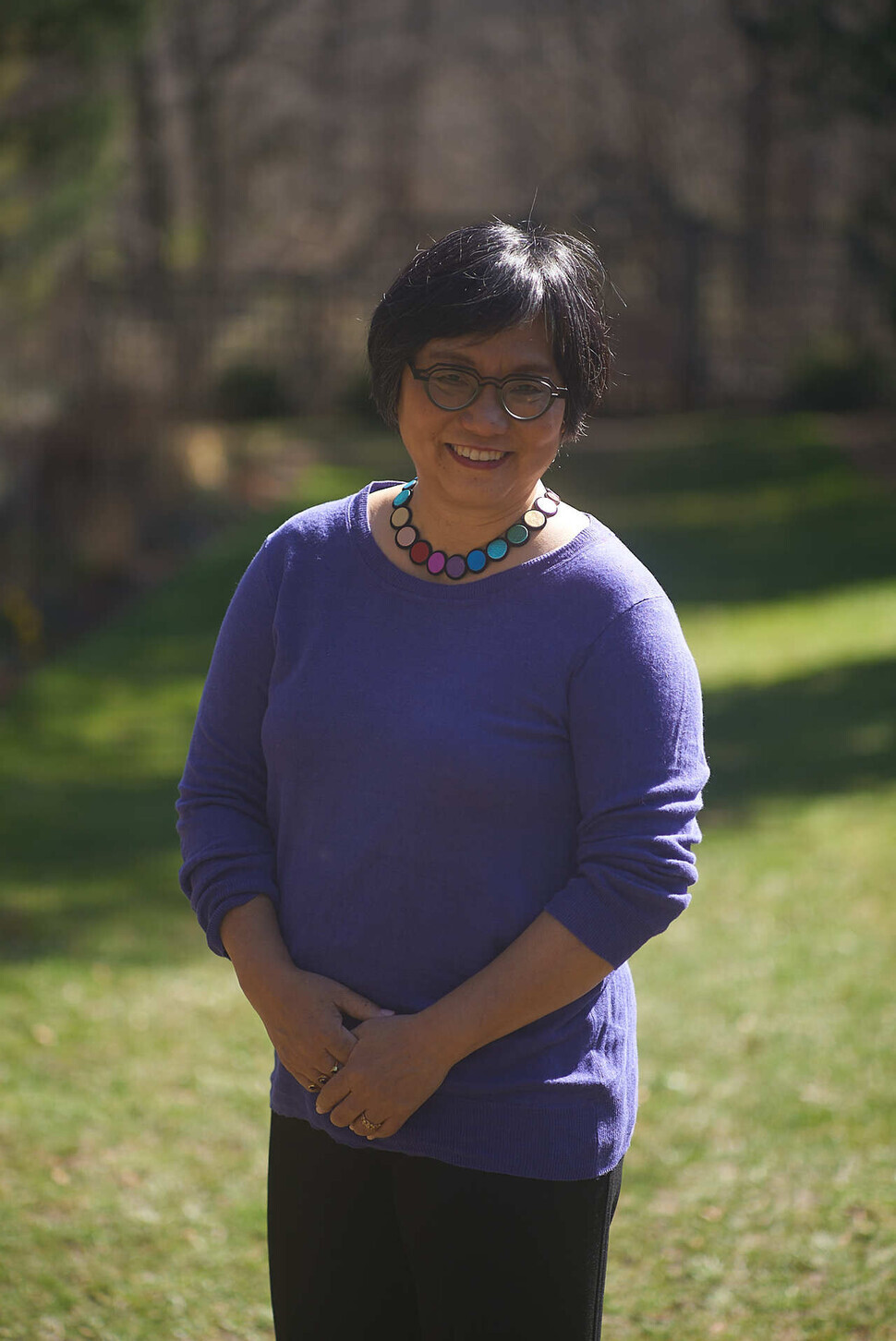hankyoreh
Links to other country sites 다른 나라 사이트 링크
As a child, Korean American author Linda Sue Park asked why the heroes in books were always white

In 2002, Korean American writer Linda Sue Park (62) received the Newbery Medal for her book “A Single Shard.” She was the first East Asian writer to win the award and only the second Asian ever to win the title since India’s Dhan Gopal Mukerji won the medal in 1928 for “Gay Neck, The Story of a Pigeon.”
Park, who draws on Korean premodern history and culture in building her literary world, has been one of the main writers who paved the way over the past 20 years for American children’s literature to move toward the current trend that values diversity. She has done this through various initiatives, including by sitting on the advisory board for the We Need Diverse Books movement, which was launched in 2014.
In a written interview with the Hankyoreh, Park said she had recently begun “another exciting project.”
“I founded and am curating a new publishing imprint within HarperCollins. It’s called Allida Books,” she said.
As the Korean name suggests — “allida” means to introduce or inform in Korean — Allida Books “will be publishing and promoting books by creators from marginalized communities.”
The term “marginalized community” refers to any community that has been pushed out of so-called “mainstream” culture due to various factors such as race, wealth and gender.
Allida Books plans to publish its first book co-authored by 12 Asian writers, including Park herself, next spring.

Besides this endeavor, Park also founded and has been running kiBooka.com for the past two years. The website’s goal is to introduce children’s books written by Korean American and Korean diaspora authors.
Park recalls how in the late 1990s when she first began her writing career, “there were only a handful of Koreans with books issued by U.S. publishers.” However, nowadays kiBooka.com “lists more than seventy creators, with new names joining every week,” she says.
Regarding this, Park says that “representation in the U.S. children’s book industry is moving—slowly, painfully—beyond tokenism.”

In this regard, Park’s 2020 book “Prairie Lotus,” out now in Korean translation, is symbolic in many ways.
Laura Ingalls Wilder’s autobiographical novel “Little House on the Prairie” tells the story of a family living in the American Midwest in the 19th century, and has long been considered one of the touchstones of American “mainstream” children’s literature.
However, in the 2010s, criticism of the book’s descriptions of black and native people as racist emerged. As a result, the Association for Library Service to Children, which had established an award named after the author in 1954, decided to strip Ingalls Wilder's name from the award in 2018.
As an American child, Park also dreamed of becoming a “perfect” American by reading “Little House on the Prairie,” but as she read mainstream books featuring white children as heroes, she began asking herself questions like, “Why couldn’t there be books that starred all different kinds of kids?”
“Prairie Lotus” is set in the same era and location as “Little House on the Prairie,” but is a story about a Chinese American girl challenging discrimination and hatred.
According to Park, “a narrow view of history leads directly to problems we’re facing today.” For example, Parks points out how for decades students were taught that the Industrial Revolution was a time of “exciting progress” but were not made aware of the “tremendous damage that was done to the environment.”

The same goes for the thinking that only stories about white people are valuable.
“As our awareness grows to include the humanity of people who were once denied respect and dignity, we need to ensure that our words, symbols, and actions reflect that growth,” Park says, calling for more stories to be written from different perspectives.
By Choi Won-hyung, staff reporter
◆ Full text of the Hankyoreh’s interview with Linda Sue Park
Hankyoreh: You have consistently put out works dealing with Korean history and traditional culture. What inspired you to become an author, and what sort of motifs do you incorporate into your work?Park: A simple answer: I was a voracious reader as a child. My parents fostered my love of books by taking me to the public library twice a month, without fail. I was so fortunate to grow up in a community that supported an excellent public library. That was how I was able to read as much as I wanted without spending a single penny!
Books were so important to me as a child, shaping the way I saw the world. What I try to do now is to write books that might have similar importance to a child reading today.
Hani: You are the first East Asian writer to win the Newbery Medal. What was the atmosphere of American society like in 2002 when you won the award, and what sort of reactions to your recognition did you encounter?
Park: For decades, American society viewed Asians as the “model minority.” Many Asian families, including my own, accepted that role without even really knowing they were doing so. It has been a long, slow process for Asians to realize that we need to define ourselves, rather than letting the dominant culture define us—a process that continues today.
After winning the award, I felt that I was expected in some ways to represent Asian Americans, which was very uncomfortable. The questions I was often asked were not specific to my lived experience, but rather were generalized for a white audience that wished to remain ensconced in its ideas of what “Asian” meant.
On the other hand, I received many messages of congratulations from Koreans and Korean Americans, which was very moving. I hadn’t realized how much the award would mean to them. There were so many people, most of them strangers, who were happy that a book on a Korean subject written by a Korean American had won such a prestigious award.
Hankyoreh: In 2021, Korean American writer Tae Keller won the Newbery Medal for “When You Trap a Tiger,” and in 2022 Chinese American writer Andrea Wang won the honor for “Watercress.” This year, which marks the 100th anniversary of the Newberry award, “The Last Cuentista,” which is rooted in Latin culture, won the medal. Could you share some thoughts about the overall trend of children’s literature in America. Especially in the last 20 years of your career as a writer, what kind of changes have you witnessed?Park: Today in the children’s book industry, there is more awareness that Asians are not a monolith—that no culture is a monolith. There is also more awareness of the harm caused by misrepresentation and inaccurate portrayals of the historical record—harm not just to individuals, but to society as a whole. Many people have come to realize the importance of working toward equity, fairness, and justice throughout every facet of our lives. In terms of books for young readers, that means a greater variety of stories created by a more inclusive roster of authors and illustrators. Again, it is a slow and difficult process, but representation in the U.S. children’s book industry is moving—slowly, painfully—beyond tokenism.
Two years ago, I started a website called kiBooka.com: Kids Books by Korean Americans and Korean diaspora. When I first began my career in the late 1990s, there were only a handful of Koreans with books issued by U.S. publishers. Today, kiBooka.com lists more than seventy creators, with new names joining every week. It is a source of great joy and satisfaction to me!
Hani: You said you wished to be a perfect American while reading “Little House on the Prairie” by Laura Ingalls Wilder in your childhood. “Little House on the Prairie” seems to have been one of the canonical books representing the mainstream of children’s literature in America for quite a long time. What did you learn from so-called mainstream literature? What books have affected your life and way of thinking?Park: Over the years, a couple of themes have emerged as essential to my work. The first is the simple and universal truth that life is unfair. How do we respond to that? It is such an important part of growing up, to realize that life is unfair and that we so often feel powerless. But if we are determined, we can find ways to fight unfairness. I think that this thread runs through a lot of children’s literature. Children are often seen as helpless by society. Good stories can help them grow into their power.
Many writers say that their stories begin with the thought, “What if…?” For many of my books, the basic thought was “Why can’t…?” Why can’t there be stories about Korean history that would interest American readers? Why can’t there be a baseball story starring a girl, instead of a boy? Why can’t there be books giving different perspectives on pioneer life? I think this grew out of the fact that almost all the books I read as a child were about white children. White kids were always the heroes. More often than not, white boys were the heroes. Why couldn’t there be books that starred all different kinds of kids?
Ultimately I think all the books that I read and loved as a child have had a great influence on my work—as both inspiration and challenge.
Hani: What do you think are the primary values that children’s literature today should pursue? What do you think children’s literature in America can contribute to children’s literature around the world?A narrow view of history leads directly to problems we’re facing today. As a simple example: For decades, students were taught that the Industrial Revolution was a time of exciting progress for the human race. They were not taught about the tremendous damage that was done to the environment. Generations grew up unconcerned about the environment—and we see today the terrible price we are paying for ignoring that perspective.
The history of the United States as it is taught to students has repeated certain lies so often that many of us grow up believing them to be true. What we are taught in essence is that the only stories worth telling are stories about white people.
“Prairie Lotus” is an attempt to view U.S. history in the 19th century through a different lens. What would life have been like for a half Asian girl back then? Hopefully Hanna’s story provides readers with a perspective that can contribute to a more complete truth. One book alone cannot achieve this, of course. We need many more stories from different points of view.
Words and symbols have power. I think it was important to remove Wilder’s name from the award because her work no longer represents the standard to strive for in books for young readers. As our awareness grows to include the humanity of people who were once denied respect and dignity, we need to ensure that our words, symbols, and actions reflect that growth.
Regarding U.S. publishing: The United States is unique—but so is every other country. Americans are fortunate to have a vibrant children’s publishing industry, with a generally high standard of professionalism and production values. And American books are distributed all over the world, Unfortunately, this is mostly a one-way street. I think kids in the U.S. need much more exposure to books from other countries. There is a great need for a more active and better-funded translation sector in children’s publishing. The film and television industries have demonstrated the tremendous potential (K-drama, Korean films, anime, Bollywood, telenovelas, etc). The book industry would do well to take heed.
Hani: What does your literary world focus on recently? What sort of projects are you working on at the current moment?Park: “The One Thing You’d Save” is my second book using the sijo form. The first is a collection called “Tap Dancing on the Roof.” Those books are another “Why can’t…?” moment for me. In this case: Why can’t sijo be as well known as haiku and other forms of poetry?
Recently I began another exciting project. I founded and am curating a new publishing imprint within HarperCollins. It’s called Allida Books. Together with Anne Hoppe, vice president and editorial director of Harper Clarion, I will be publishing and promoting books by creators from marginalized communities. The mission is to publish books that free creators from any expectations of what they’re “supposed” to write about, and focus on their passions instead. When artists are impassioned about their subjects, kids get better books.
Hani: There are concerns that children’s reading experience is significantly decreasing due to the rapid development of digital media. As a writer, what do you make of these concerns and what do you think we should do so that children can have richer experiences through books?Park: This is not the first time that people have predicted the death of the book. It was thought that radio would kill reading. Then it was movies, and then television. Now it’s digital entertainment and streaming. I’m not smart enough to know what the future holds for printed books, but I do know that stories will always be important. We learn through story and we pass on knowledge and wisdom through story. Reading is one of the most important ways that we share stories and connect with the rest of the world.
Please direct questions or comments to [english@hani.co.kr]

Editorial・opinion
![[Column] When ‘fairness’ means hate and violence [Column] When ‘fairness’ means hate and violence](https://flexible.img.hani.co.kr/flexible/normal/500/300/imgdb/original/2024/0516/7417158465908824.jpg) [Column] When ‘fairness’ means hate and violence
[Column] When ‘fairness’ means hate and violence![[Editorial] Yoon must stop abusing authority to shield himself from investigation [Editorial] Yoon must stop abusing authority to shield himself from investigation](https://flexible.img.hani.co.kr/flexible/normal/500/300/imgdb/original/2024/0516/4417158464854198.jpg) [Editorial] Yoon must stop abusing authority to shield himself from investigation
[Editorial] Yoon must stop abusing authority to shield himself from investigation- [Column] US troop withdrawal from Korea could be the Acheson Line all over
- [Column] How to win back readers who’ve turned to YouTube for news
- [Column] Welcome to the president’s pity party
- [Editorial] Korea must respond firmly to Japan’s attempt to usurp Line
- [Editorial] Transfers of prosecutors investigating Korea’s first lady send chilling message
- [Column] Will Seoul’s ties with Moscow really recover on their own?
- [Column] Samsung’s ‘lost decade’ and Lee Jae-yong’s mismatched chopsticks
- [Correspondent’s column] The real reason the US is worried about Chinese ‘overcapacity’
Most viewed articles
- 1China calls US tariffs ‘madness,’ warns of full-on trade conflict
- 2[Column] US troop withdrawal from Korea could be the Acheson Line all over
- 3[Editorial] Yoon must stop abusing authority to shield himself from investigation
- 4[Column] When ‘fairness’ means hate and violence
- 5[Column] How to win back readers who’ve turned to YouTube for news
- 6US has always pulled troops from Korea unilaterally — is Yoon prepared for it to happen again?
- 7[Book review] Who said Asians can’t make some good trouble?
- 8Naver’s union calls for action from government over possible Japanese buyout of Line
- 9Could Korea’s Naver lose control of Line to Japan?
- 10[Editorial] Korea must respond firmly to Japan’s attempt to usurp Line